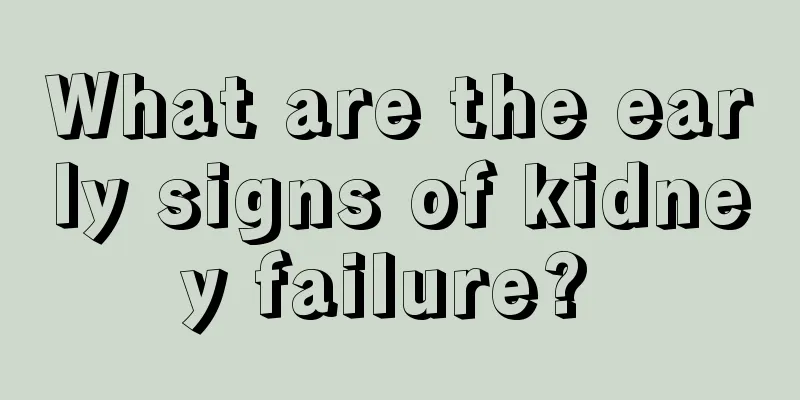What are the early signs of kidney failure?

|
The kidneys are the core organs of the human body. They act like a filter, filtering out waste in the body and excreting it through the urethra to ensure the health of the body. Once there is a problem with the kidneys, it will cause great harm to the body and even threaten the patient's life. Let's take a look at the early signs of kidney problems. Signal 1: Edema The first thing that appears is edema. It depends on the specific condition of the edema, which can be severe or mild. This is an obvious symptom of nephritis. The general symptoms are eyelid or facial edema in the morning, and edema in the lower limbs in the afternoon. Signal 2: High blood pressure High blood pressure is also a sign of poor kidney function. Because the kidneys are located at a high position, kidney problems are more likely to occur when high blood pressure exists. I hope everyone can pay attention to this. It can be seen that hypertension and kidneys affect each other. Therefore, if blood pressure persists, be careful about whether there is a problem with the kidneys. Signal three: Abnormal urine The abnormality of urine is mainly manifested in the decrease or increase of urine, which is almost a necessary phenomenon for all patients with chronic nephritis. Patients with edema will find that their urine volume decreases, and the greater the degree of edema, the more obvious the decrease in urine volume. Too much or too little urine is a sign of poor kidney function. The normal urine volume is 1000~2000 ml/day, with an average of about 1500 ml/day. Whether the urine volume increases or decreases, dryness and dullness of the face may be manifestations of kidney disease, especially nocturnal polyuria is often a signal of kidney disease. Signal 4: Don’t want to eat Loss of appetite, anorexia, or even nausea and vomiting are also common symptoms of kidney disease. Therefore, the complexion is sallow and dull. Some patients always go to the gastroenterology department or hepatology department first to see if they have stomach or liver disease. If they find that they do not have stomach or liver disease, they just leave it alone and forget to see a nephrologist, which results in delaying the treatment. |
<<: Is donating platelets harmful to your health?
>>: How to diagnose early Parkinson's disease?
Recommend
The difference between liver pain and gallbladder pain
Because the liver and gallbladder are very close,...
What symptoms do patients with lung tumors have?
Many people think that patients with lung disease...
What causes laryngeal cancer?
The incidence of laryngeal cancer is very high in...
8 secrets to help you reverse aging
Youth is fleeting and time is merciless. However,...
What are the symptoms of bile reflux?
Bile reflux is very common in some serious gastro...
Brief analysis of the nursing care of patients with cervical cancer after common radiotherapy
Radiotherapy is one of the common treatments for ...
Why do teeth bleed when drinking water?
Oral disease is the most common problem in our li...
Effective measures to prevent laryngeal cancer
Laryngeal cancer is a common cancer disease in th...
What are the hazards of moisture to the human body
Nowadays people's physical health is getting ...
How much do you know about the treatment of laryngeal cancer
After suffering from laryngeal cancer, the larynx...
How to massage breasts to make them bigger, you need to know these two acupoints
With the trend of society, many women want to hav...
What causes lower abdominal pain during bowel movements?
Defecation is an essential behavior of the human ...
How to treat irritable bowel syndrome
Nowadays, many young people suffer from irritable...
What is the pathogenesis of colon cancer
Colon cancer is one of the common malignant tumor...
What to do if your face is allergic to alcohol
The skin on the face is usually very delicate. So...









